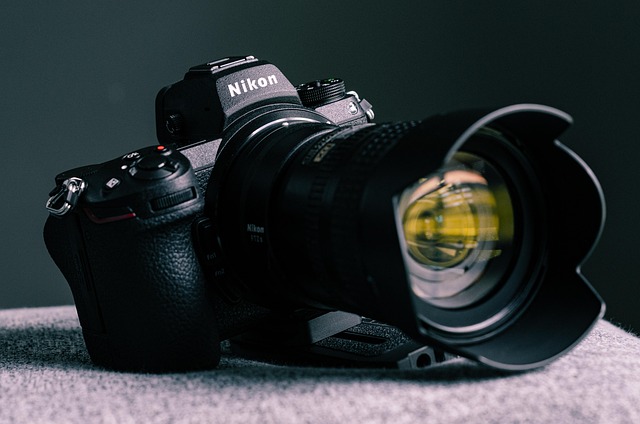
Nikon has built a solid reputation in the realm of astrophotography with lenses renowned for their sharpness and durability. Precise engineering and attention to detail, paired with cutting-edge technology make Nikon lenses a fantastic choice for astrophotography.
In this article you can discover three great options in the best Nikon lens for astrophotography as budget friendly, intermediate and high-end options.
The budget friendly lens is designed for Nikon’s DX-format DSLRs, while the intermediate and high-end options are designed for Nikon’s FX-format DSLRs.
Note: This post contains affiliate links. If you buy through these links, I may earn a small commission at no extra cost to you. As an Amazon Associate, I earn from qualifying purchases.
Quality Budget-Friendly Lens: Nikon AF-S DX NIKKOR 35mm f/1.8G
The Nikon AF-S DX NIKKOR 35mm f/1.8G is a popular and affordable prime lens designed for Nikon’s DX-format DSLRs.
Offering a great starting point without breaking the bank, this budget-friendly lens is well-suited for those just dipping their toes into astrophotography.
- F Mount Lens/DX Format
- 52.5mm (35mm Equivalent)
- Aperture Range: f/1.8 to 22
- Silent Wave Motor AF System
- Rear Focusing; Manual Focus Override
One standout feature is its fast f/1.8 aperture, which is great for low-light conditions, letting you capture more light from distant stars and beautiful moonlit scenes. You won’t have to worry much about noise at higher ISO settings either, as the clarity and detail capture will hold their own against pricier options.
It works well as a standard prime lens on DX-format Nikon DSLRs, providing an effective focal length of 52.5mm
It’s lightweight too, which means it’s perfect for mobile setups where lugging less gear is a plus. The build quality for this lens is decent, but to help keep the weight down is primarily made of plastic.
In terms of value for money, this lens hits the sweet spot. Affordable yet packed with enough features to make night-time shooting a rewarding experience.
Top Intermediate Choice: Nikon AF-S NIKKOR 24mm f/1.4G ED
For those looking to elevate their astrophotography game, Nikon offers lenses that cater to both intermediate and professional needs.
Two lenses stand out when considering quality and capability – the Nikon AF-S NIKKOR 24mm f/1.4G ED for those stepping up, and the Nikon AF-S NIKKOR 14-24mm f/2.8G ED for those seeking the crème de la crème.
- Professional ultra-fast aperture wide-angle lens
- 9-blade rounded aperture produces soft and pleasing blur characteristics
- Nano Crystal coat reduces ghost and flare
- ED (Extra low Dispersion) glass and aspherical lens elements ensure high resolution and superior contrast
- SWM (Silent Wave Motor) for fast and quiet autofocus
The Nikon AF-S NIKKOR 24mm f/1.4G lens is a superb choice for intermediate photographers keen on capturing sprawling sky vistas or deep space shots with sharp detail and contrast.
Its f/1.4 aperture is ideal for low-light conditions, offering the ability to maintain image sharpness without pushing ISO levels too high. The extra bit of width helps bring more of the night sky into frame, making for dramatic wide-angle shots that encapsulate the expanse above.
This lens delivers sharp, high-contrast images with minimal distortion, making it perfect for capturing wide-field nightscapes. Its build quality and professional-grade features make it a robust choice for those looking to elevate their astrophotography.
High-End Excellence: Nikon AF-S NIKKOR 14-24mm f/2.8G ED
In the high end range, the 14-24mm f/2.8G lens brings unparalleled construction and precision, making it a favourite among professional super wide angle photographers. The lens delivers superb sharpness and clarity across the frame, even at its widest aperture of f/1.4.
Chromatic aberrations and distortions are minimized by the inclusion of two ED (extra-low dispersion) glass elements and three aspherical elements. This helps this Nikon lens perform remarkably well in low-light conditions, ideal for astrophotography.
This excellent offering from Nikon is of a high quality construction with weather and dust sealing, ensuring durability in various shooting conditions
Its wider focal range is perfect for night landscapes, capturing everything from sprawling star fields to shimmering auroras.
Kickstart your stargazing journey with six beginner-friendly astrophotography cameras featured in our post: Best Astrophotography Camera for Beginners
Can I Use The Same Nikon Lens For Either DSLR Or Mirrorless Cameras?
Yes, you can use the same Nikon lens for both DSLR and mirrorless cameras, but you will need an adapter.
Nikon offers the FTZ Mount Adapter, which allows you to attach F-mount DSLR lenses to Z-mount mirrorless cameras. Here are a few points to consider:
The Nikon FTZ Mount Adapter maintains full functionality, including autofocus and exposure control, ensuring a seamless transition from DSLR to mirrorless shooting.
Using an adapter expands your lens options, allowing you to use your existing DSLR lenses on a new mirrorless body without needing to invest in new lenses immediately.
Using an adapter can add some bulk and weight to your setup, which might affect the balance and handling of the camera.
Overall, using an adapter is a practical solution for photographers transitioning from DSLR to mirrorless systems, allowing them to continue using their existing lenses while exploring the benefits of mirrorless technology.





